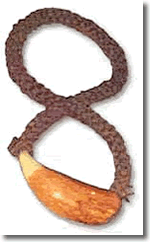|

Tabua or Kamunaga
The tabua –Tam-BOO-wah) or whale’s tooth is obtained from the sperm or cacholot whale and plays an important role in Fiji ceremonies. They are presented to distinguished guests and are exchanged at betrothals, weddings, births, deaths, and when personal or communal agreements or contracts are entered into including the condoning of sinful act.
Traditionally, it is a great honor to be accorded with a tabua because of its sacredness and the value attached to it. It is an infringement of the Fijian law to take a tabua out of Fiji without expressed and written permission from the Ministry of Fijian Affairs.
Tabuas have been in use in Fiji for over 150 years. Prior to this, wooden bua-ta (Boor-TAR) were used. These were highly polished woods from the bua tree (frangipani tree) and shaped similar to the tabua now in use as traditional offerings.
The tabuas were polished with coral sand, coconut oil and leaves of a tree known as the masi-ni-tabua. The shiny effect maintained permanently through constant handling and also from the long-lasting effect of the solution initially rubbed on them.
When the whalers first visited Fiji, they brought ashore whale’s teeth to use for trading purposes. Fijians were struck by the similarity of these to the wooden bua-ta. The Fijians thus named them tabua, derivation from the Fijian word tabu (tar-MBOO) meaning sacred.
A highly polished surface is today as much esteemed in a tabua but size, especially the thickness as judged when looking down directly over the tabua is the main criterion for its value.
When a tabua is about to be presented to a high chief, an elder among those performing the presentation announces a formal and stern greeting known as turivukitabua, (TOOREE-Varkey-TAMBOO-wah) by uttering these vowel and consonants WAH………..OI-ee……..OI-ee…….
On hearing the expression, the chief understands that the presentation is about to take place and his spokesman replies in the same vein. The ceremonial team formally referred to a tabua as kamunaga (CAR-moo-NUNG-ngha), and this word is used during all ceremonial presentations. Up to this point, the tabua or kamunaga remains unseen but now the individual who is to make the presentation produces it holding it in his left hand and the cord in his right. He begins by addressing the Chief formally in mentioning the chiefly traditional provincial title before the short speech of welcome. At the conclusion, the spokesman would reiterate the special traditional greeting before handing over the kamunaga to the Chief.
Apart from the element of goodwill in every presentation, it is frequently a vehicle for a request, and acceptance of the tabua implies that the recipient is honor bound to carry out his request.
The Tabua is a whale’s tooth, is much prized in Fijian tradition. It takes precedence over everything else and occupies first place in Fiji ceremony, whether for family, intertribal or state occasions. It is regarded as a sacred bond between two parties. It is also used as a symbol of peace and disputes or quarrels can be smoothened over by its presentation
Today, the presentation of a tabua is often a gesture of goodwill, respect or loyalty from the persons presenting it and the detailed ceremonial ritual is always carefully carried out. It is also often presented at ceremonies associated with births, deaths, marriages, the naming of a child, on departing or returning from a long journey, or after a yaqona ceremony particularly when a chief has been installed and on many other occasions and also the condoning of the violation of traditional law of the land (as explained earlier.)
|

